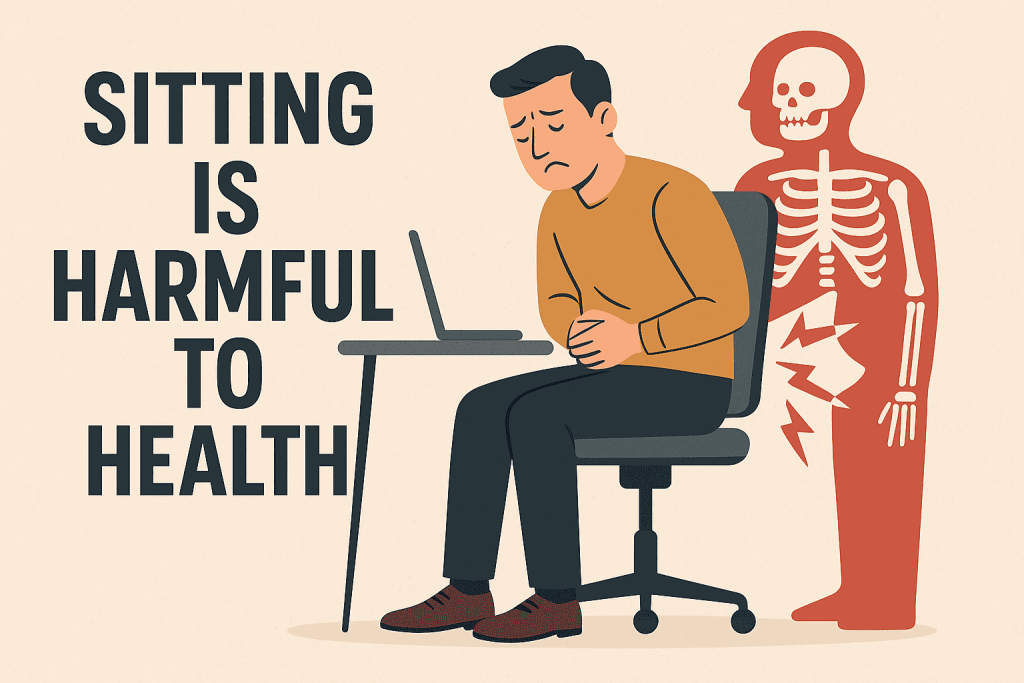The Link Between Sitting and Disease
Existing evidence from research has revealed that sitting too long is harming our health in ways that we do not even realise. Activities such as using a computer, watching TV, travelling long distances, etc. all involve sitting for a very long time. The risks have become even higher with the widespread use of technology including phones, laptops and television. Additionally, remote jobs means that people can work from home, often sitting all day.

Although research has shown that spending hours sitting in the same position could be dangerous for your health, the direct causes are not fully known. In this article, you will uncover some hidden dangers of sitting all day and learn practical tips on how to cut down your sitting hours.
Dangers Associated with Long Hours of Sitting
Poor Heart Health
As an organ, the heart thrives on good nutrition and physical activity. Sitting all day can be harmful to the heart because it reduces blood circulation. When blood flow slows down in the blood vessels, it can lead to the formation of blood clots called thrombus, especially in the lower limbs. This clot may also break off and block blood vessels in the heart, lungs or brain.
Poor Brain Health
Decreased blood circulation limits the supply of oxygen and nutrients to the brain. This may lead to problems with memory, attention and decision-making. Also, sitting causes similar changes that are seen in dementia in the brain of a normal person.
If you sit all day, your body is unable to regulate the production of cortisol, leading to a higher risk of depression and anxiety.
Reduced Metabolism
Sitting all day can harm your health, even if you exercise as recommended. Sitting uses less energy compared to walking or standing. It also causes the accumulation of fat and increases the risk of obesity. Obesity is an important risk factor for cardiovascular diseases, type2 diabetes, liver disease, etc.
Short Lifespan
A short lifespan is the ultimate danger of sitting all day. Most people do not realise that sitting for long hours at a stretch is one habit that can shorten their lives. This is due to the effects of poor metabolism, chronic inflammation and mental health decline. This increases the risk of diseases such as dementia, cancer and heart disease which may result in early death.
ALSO READ: How Excessive Screen Time Affects Cardiovascular Health
Tips on how to cut down your sitting hours
All types of movement can be beneficial to your health, in addition to getting the recommended 150 minutes of exercise every week as an adult. Below are some tips that can keep you moving:
- Get rid of your chair: Working while standing behind a desk to avoid sitting for too long, especially if you have large amounts of tasks to complete.
- Take frequent breaks: Most people focus on a task for hours in order to meet deadlines. If you have a lot to do, you can set a timer to take stand, stretch or take a walk every 30 minutes or 1 hour.
- Limit screen time: Setting a limit for your daily screen time on television, phone or laptop can help you reduce the amount of time you spend sitting.
- Engage in hobbies: For many people, downtime means movie time. Instead, you can use the time for your hobbies such as sports, dancing, cycling or gardening.
- Do your chores: Household chores like washing plates, cleaning your room or doing the laundry help to reduce idle sitting.
How long is too long?
Here is the question: “For how many hours maximum should you sit per day?”. Unfortunately, there is insufficient information that can give us a fixed time limit. Instead, the general approach is to cut down activities that involve sitting a lot and substituting them with active movements.
While you may not know how much sitting can harm your body, you can begin to make small changes in your daily routine to safeguard your health and increase your lifespan.









